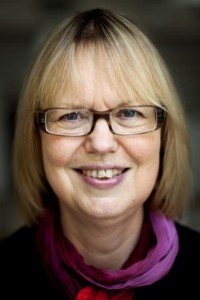 Principal Investigator Helene Brembeck is professor of ethnology and director of Center for Consumer Science (CFK) at the School of Business, Economics and Law, University of Gothenburg, Sweden. Helene’s research interests are parenthood and childhood in consumer culture, food and eating, and second-hand cultures and cultural heritage. She has published several books and anthologies. Helene has been the leader of several large projects at CFK, including Commercial Cultures 2001-2005 and The Multi-dimensional Food Consumer 2004-2007. Among her ongoing projects are Re:heritage – a project studying how heritage is performed in the rapidly expanding second hand, re-use and vintage market, and Consumer Logistics – an international project studying how consumers transport recent purchases. Her most recent publication is as co-author of Life Phases, Mobility and Consumption: An Ethnography of Shopping Routes (Ashgate 2015).
Principal Investigator Helene Brembeck is professor of ethnology and director of Center for Consumer Science (CFK) at the School of Business, Economics and Law, University of Gothenburg, Sweden. Helene’s research interests are parenthood and childhood in consumer culture, food and eating, and second-hand cultures and cultural heritage. She has published several books and anthologies. Helene has been the leader of several large projects at CFK, including Commercial Cultures 2001-2005 and The Multi-dimensional Food Consumer 2004-2007. Among her ongoing projects are Re:heritage – a project studying how heritage is performed in the rapidly expanding second hand, re-use and vintage market, and Consumer Logistics – an international project studying how consumers transport recent purchases. Her most recent publication is as co-author of Life Phases, Mobility and Consumption: An Ethnography of Shopping Routes (Ashgate 2015).
N icholas Gebhardt is Professor of Jazz and Popular Music Studies at Birmingham City University, UK and Director of the Birmingham Centre for Media and Cultural Studies. His work focuses on jazz and popular music in American culture and his publications include Going For Jazz: Musical Practices and American Ideology (University of Chicago Press, 2001) and The Cultural Politics of Jazz Collectives: This Is Our Music (Routledge, 2015). He was a member of the Rhythm Changes: Jazz Cultures and European Identities project team (2010-2013). He is co-editor of the Routledge book series Transnational Studies in Jazz and on the editorial board of the Jazz Research Journal. He was lead organiser of the 2016 4th Rhythm Changes international conference, Jazz Utopia.
icholas Gebhardt is Professor of Jazz and Popular Music Studies at Birmingham City University, UK and Director of the Birmingham Centre for Media and Cultural Studies. His work focuses on jazz and popular music in American culture and his publications include Going For Jazz: Musical Practices and American Ideology (University of Chicago Press, 2001) and The Cultural Politics of Jazz Collectives: This Is Our Music (Routledge, 2015). He was a member of the Rhythm Changes: Jazz Cultures and European Identities project team (2010-2013). He is co-editor of the Routledge book series Transnational Studies in Jazz and on the editorial board of the Jazz Research Journal. He was lead organiser of the 2016 4th Rhythm Changes international conference, Jazz Utopia.
 Merja Liimatainen holds a masters degree in ethnology and is a research assistant in the Center for Consumer Science at School of Business, Economics and Law, University of Gothenburg. Apart from working on CHIME she is also a research assistant on the project Re:heritage. Her most recent publication is Pop Boutique – a world of re-use of fashion on the Re:heritage market.
Merja Liimatainen holds a masters degree in ethnology and is a research assistant in the Center for Consumer Science at School of Business, Economics and Law, University of Gothenburg. Apart from working on CHIME she is also a research assistant on the project Re:heritage. Her most recent publication is Pop Boutique – a world of re-use of fashion on the Re:heritage market.
George McKay is Professor of Media Studies at the University of East Anglia, UK. He holds a six-year AHRC Leadership Fellowship for the Connected Communities Programme (2012-18). His research interests are in alternative culture and media, the cultural politics of popular music – including jazz –, disability, festivals, and gardening. Among his books are:
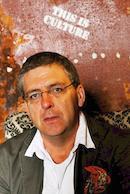 Senseless Acts of Beauty: Cultures of Resistance since the Sixties (Verso, 1996)
Senseless Acts of Beauty: Cultures of Resistance since the Sixties (Verso, 1996)- DiY Culture: Party & Protest in Nineties Britain (ed., Verso, 1998)
- Glastonbury: A Very English Fair (Gollancz, 2000)
- Community Music: A Handbook (joint-ed. with Pete Moser, Russell House, 2004)
- Issues in Americanisation and Culture (co-ed. with Neil Campbell and Jude Davies, Edinburgh UP, 2004)
- Circular Breathing: The Cultural Politics of Jazz in Britain (Duke UP, 2005)
- Radical Gardening: Politics, Idealism and Rebellion in the Garden (Frances Lincoln, 2011)
- Shakin’ All Over: Popular Music and Disability (University of Michigan Press, 2013) and
- The Pop Festival: History, Music, Media, Culture (ed., Bloomsbury, 2015).
He is currently editing with Gina Arnold The Oxford Handbook of Punk Rock.
George has been in receipt of over 30 research grants and funding awards, totalling over £5.3m. He was founding co-editor in 2002 of Social Movement Studies: Journal of Social, Cultural and Political Protest (Routledge), was special issue editor of Popular Music (28:3; 2009) on the theme of popular music and disability, and is co-editor with Tony Whyton of a special issue of the International Journal of Heritage Studies on CHIME findings. He is currently a member of the editorial board of Jazz Research Journal and Consulting Editor for Social Movement Studies. He too was a member of Rhythm Changes. He has been a visiting scholar at University of Southern Maine (1994), University of Veliko Turnovo (1996), and University of Sydney (2008). He attended his first music festival in 1977, and innovated the public engagement role of Festival Professor in Residence at Kendal Calling (2011) and EFG London Jazz Festival (2014). He is a part-time double bassist; his website is georgemckay.org.
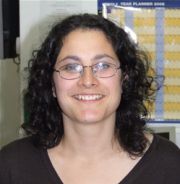 Beth Perry is a Professorial Fellow in the Faculty of Social Sciences at the University of Sheffield, UK. Her research focuses on critically interrogating and developing pathways to more just sustainable urban futures, with an emphasis on urban governance and the roles of universities and academics. In the last 4 years, Beth has been Principal Investigator on two major programmes of work. She has led participation in the Arts and Humanities Research Council’s Connected Communities programme through a project on ‘Cultural Intermediation in the Creative Urban Economy’, led by Birmingham University. Since 2014 this has involved working with Jess Symons in an initiative called ‘Ideas4Ordsall’, supporting local people to develop their own ideas for creative activities in the Ordsall area of Salford. She has also directed the Greater Manchester Local Interaction Platform (GMLIP) for Mistra Urban Futures, an international centre for sustainable cities with partners in Sweden, Kenya, South Africa and the UK.
Beth Perry is a Professorial Fellow in the Faculty of Social Sciences at the University of Sheffield, UK. Her research focuses on critically interrogating and developing pathways to more just sustainable urban futures, with an emphasis on urban governance and the roles of universities and academics. In the last 4 years, Beth has been Principal Investigator on two major programmes of work. She has led participation in the Arts and Humanities Research Council’s Connected Communities programme through a project on ‘Cultural Intermediation in the Creative Urban Economy’, led by Birmingham University. Since 2014 this has involved working with Jess Symons in an initiative called ‘Ideas4Ordsall’, supporting local people to develop their own ideas for creative activities in the Ordsall area of Salford. She has also directed the Greater Manchester Local Interaction Platform (GMLIP) for Mistra Urban Futures, an international centre for sustainable cities with partners in Sweden, Kenya, South Africa and the UK.
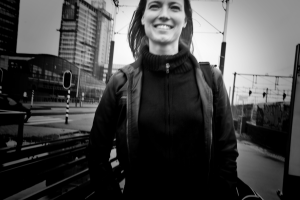 Loes Rusch is a musicologist and saxophonist who worked as part of the HERA JRP Rhythm Changes project from 2010-2014. She wrote her PhD on Dutch jazz cultures, focusing on the cultural politics of jazz, concepts of national thought and identity in music, and the relationship between music, representation and cultural policy-making. Currently, Rusch divides her post-doctoral research for CHIME between the University of Amsterdam and Birmingham City University, and she continues to work in partnership with institutions from the arts, heritage and museums sector across Europe. In addition to her work for CHIME, Rusch continues to play baritone saxophone in various jazz and pop groups and works as curator for the Wonderfeel music festival in the Netherlands.
Loes Rusch is a musicologist and saxophonist who worked as part of the HERA JRP Rhythm Changes project from 2010-2014. She wrote her PhD on Dutch jazz cultures, focusing on the cultural politics of jazz, concepts of national thought and identity in music, and the relationship between music, representation and cultural policy-making. Currently, Rusch divides her post-doctoral research for CHIME between the University of Amsterdam and Birmingham City University, and she continues to work in partnership with institutions from the arts, heritage and museums sector across Europe. In addition to her work for CHIME, Rusch continues to play baritone saxophone in various jazz and pop groups and works as curator for the Wonderfeel music festival in the Netherlands.
Niklas Sörum, PhD in ethnology, is a researcher at Center for Consumer Science in the School of Business, Economics and Law, University of Gothenburg. He studies consumer behavior, consumer logistics, sustainable consumption and the marketization of cultural values. His most recent publication is as co-author of Life Phases, Mobility and Consumption: An Ethnography of Shopping Routes (Ashgate 2015), a book stemming from the research project Consumer Logistics – an international project studying how consumers transport recent purchases. Other ongoing projects are Digcon that studies the social, cultural and economic consequences of the digitalization of consumption, and Re:heritage – a project studying how heritage is performed in the rapidly expanding second hand-, re-use- and vintage markets.
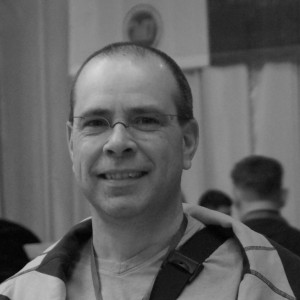 Principal Investigator Walter van de Leur is Professor of Jazz and Improvised Music at the University of Amsterdam (UvA), on behalf of Conservatorium van Amsterdam (CvA). Besides his specialisation in the music of Duke Ellington and Billy Strayhorn (which resulted in his award-winning Something to Live For: The Music of Billy Strayhorn, Oxford University Press, 2002) his research focuses on the reception of jazz in Europe, jazz and identity, and jazz and death. In these transdisciplinary endeavours he uses jazz as a lens to look at ideas and ideologies that surround this music. Van de Leur served as Principal Investigator and Senior Researcher for Rhythm Changes (2010-2013). In that capacity, he directed the Jazz and National Identities Conference in 2011, and the Jazz Beyond Borders Conference in 2014, both hosted by the CvA.
Principal Investigator Walter van de Leur is Professor of Jazz and Improvised Music at the University of Amsterdam (UvA), on behalf of Conservatorium van Amsterdam (CvA). Besides his specialisation in the music of Duke Ellington and Billy Strayhorn (which resulted in his award-winning Something to Live For: The Music of Billy Strayhorn, Oxford University Press, 2002) his research focuses on the reception of jazz in Europe, jazz and identity, and jazz and death. In these transdisciplinary endeavours he uses jazz as a lens to look at ideas and ideologies that surround this music. Van de Leur served as Principal Investigator and Senior Researcher for Rhythm Changes (2010-2013). In that capacity, he directed the Jazz and National Identities Conference in 2011, and the Jazz Beyond Borders Conference in 2014, both hosted by the CvA.
Van de Leur is on the editorial board of Jazz Perspectives, a peer-reviewed journal published by Routledge, for which he guest-edited the special issue on Ellington (6:1-2, 2012). He is also on the boards of Music and Research (University of Oslo), the Journal of the Royal Society for Music History in the Netherlands (Utrecht University) and the University of Michigan Press’ Jazz Series. He has published articles in a variety of peer-reviewed academic journals and has chapters forthcoming in a number of edited volumes: The Cambridge Companion to Duke Ellington (2014); The Duke Ellington Studies Anthology (Cambridge); Musicians and Audiences (Ashgate); Singing Death (Ashgate); Transnational America—Transnational Europe? (Brill). He writes regularly in non-academic journals too, such as the Dutch Jazz Archive’s Jazzbulletin, and has contributed extensively to Billy Strayhorn: An Illustrated History (Agate, 2015). Two book manuscripts are currently in process, one on the reception of jazz in Europe, and one on jazz and death.
Project Leader T ony Whyton is Professor of Jazz Studies at Birmingham City University. His research works across the boundaries of musicology, media and cultural studies and promotes research as both an enterprise and knowledge exchange activity. From 2010-2013, he was Project Leader for the ground-breaking HERA-funded Rhythm Changes: Jazz Cultures and European Identities project, leading a consortium of 13 researchers working across seven universities in five countries. Whyton’s critically acclaimed books Jazz Icons: Heroes, Myths and the Jazz Tradition (Cambridge University Press, 2010) and Beyond A Love Supreme: John Coltrane and the Legacy of an Album (Oxford University Press, 2013) have sought to develop cross-disciplinary methods of musical enquiry. As an editor, Whyton published the Jazz volume of the Ashgate Library of Essays on Popular Music in 2011 and continues to work as co-editor of the Jazz Research Journal (Equinox). In 2014, he founded the new Routledge series Transnational Studies in Jazz alongside BCU colleague Prof Nicholas Gebhardt. Gebhardt and Whyton also edited The Cultural Politics of Jazz Collectives: This Is Our Music (Routledge) in 2015, a collection that explores the ways in which musician-led collectives offer a powerful model for rethinking jazz practices in the post-war period.
ony Whyton is Professor of Jazz Studies at Birmingham City University. His research works across the boundaries of musicology, media and cultural studies and promotes research as both an enterprise and knowledge exchange activity. From 2010-2013, he was Project Leader for the ground-breaking HERA-funded Rhythm Changes: Jazz Cultures and European Identities project, leading a consortium of 13 researchers working across seven universities in five countries. Whyton’s critically acclaimed books Jazz Icons: Heroes, Myths and the Jazz Tradition (Cambridge University Press, 2010) and Beyond A Love Supreme: John Coltrane and the Legacy of an Album (Oxford University Press, 2013) have sought to develop cross-disciplinary methods of musical enquiry. As an editor, Whyton published the Jazz volume of the Ashgate Library of Essays on Popular Music in 2011 and continues to work as co-editor of the Jazz Research Journal (Equinox). In 2014, he founded the new Routledge series Transnational Studies in Jazz alongside BCU colleague Prof Nicholas Gebhardt. Gebhardt and Whyton also edited The Cultural Politics of Jazz Collectives: This Is Our Music (Routledge) in 2015, a collection that explores the ways in which musician-led collectives offer a powerful model for rethinking jazz practices in the post-war period.
Marline Lisette Wilders specializes in aesthetic experiences in relationship to the experience of space and place. She combines audience and reception research with other research methods such as archive research, cultural analysis and research through design. Currently she is a post-doctoral researcher at the University of Amsterdam and the University of Groningen and on the Dutch te am for CHIME.
am for CHIME.
She received her PhD on Theaterbeleving in het belevenistheater in 2012; in it she investigated the theatre experience in experience theatres and explored the effects of the architectural characteristics of theatre buildings on the experience of the theatrical event. In 2013 the Netherlands Organisation for Scientific Research (NWO) awarded her a Rubicon fellowship for the project From working space to theatre space; the user perspective. She executed this project as a visiting post-doctoral researcher at the Interuniversitary Department of Regional and Urban Studies and Planning of the Polytechnic University of Turin between 2014-2016, looking into the effects of adaptive reuse of industrial heritage sites for the functioning of both the performing arts and built industrial heritage in society. She recently published the book [RE]FRAME on the project.
Research and project associates
The work of CHIME doesn’t happen in isolation; many of the academic team work on other projects, with other researchers and colleagues. There is great cross-fertilisation, of energies and ideas. And thus a related amplification of impact! Below is information about key research and project associates who work closely with CHIME.
Rachel Daniel provides administrative and event support for Prof George McKay and the AHRC Connected Communities programme from the University of East Anglia. This includes The Impact of Festivals project, which has significant cross-over with CHIME. Methodologically, too, there are links between Connected Communities and CHIME, through each’s emphasis on collaborative research partnerships and co-production. Rachel’s background is in art and she is currently undertaking a practice-based PhD exploring the use of art in healthcare environments. Her website for art practice is here.
Olle Stenbäck, ethnologist and ethnomusicologist, holds a master’s degree in ethnology and is currently a PhD grad at the University of Gothenburg. This spring he is defending his thesis about the phenomena of in-store music; musical flows, affective networks, listening perspectives and store marketing strategies. Olle is also on the board of the Gothenburg Radio Museum, where he’s been researching early broadcasting technologies.
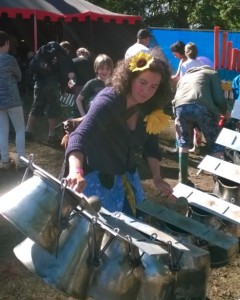 Dr Emma Webster was the postdoctoral researcher on The Impact of Festivals project (2015-16), part of the AHRC’s Connected Communities programme. She is an academic expert on live music and festivals and is also a music and comedy promoter in her spare time. In 2012, Emma and colleagues at the Universities of Edinburgh and Glasgow set up the Live Music Exchange, an online hub for anyone interested in live music research. More recently, Emma worked on a census of live music in Edinburgh in 2015 and wrote the six-year report of the Association of Independent Festivals in 2014. Among her academic publications is the co-authored three-volume series The History of Live Music in Britain (Frith, Brennan, Cloonan and Webster), of which the first, covering 1950-1967, was published by Ashgate in 2013.
Dr Emma Webster was the postdoctoral researcher on The Impact of Festivals project (2015-16), part of the AHRC’s Connected Communities programme. She is an academic expert on live music and festivals and is also a music and comedy promoter in her spare time. In 2012, Emma and colleagues at the Universities of Edinburgh and Glasgow set up the Live Music Exchange, an online hub for anyone interested in live music research. More recently, Emma worked on a census of live music in Edinburgh in 2015 and wrote the six-year report of the Association of Independent Festivals in 2014. Among her academic publications is the co-authored three-volume series The History of Live Music in Britain (Frith, Brennan, Cloonan and Webster), of which the first, covering 1950-1967, was published by Ashgate in 2013.
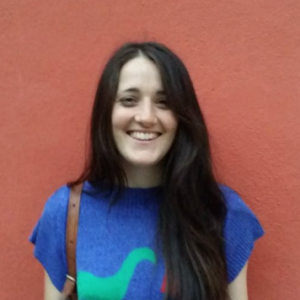 Beth Aggett is assisting Prof Walter van de Leur in forthcoming research as an MA student at the University of Amsterdam. She did her undergraduate degree in Music at Durham University in the UK, specialising in both contemporary music (composition) and popular music studies (ethnographic research). She is currently studying an MA in Musicology at the University of Amsterdam, with focus on the cultural politics of jazz and the relationship between music, identity and place. She is also a semi-professional jazz vocalist and vocal coach.
Beth Aggett is assisting Prof Walter van de Leur in forthcoming research as an MA student at the University of Amsterdam. She did her undergraduate degree in Music at Durham University in the UK, specialising in both contemporary music (composition) and popular music studies (ethnographic research). She is currently studying an MA in Musicology at the University of Amsterdam, with focus on the cultural politics of jazz and the relationship between music, identity and place. She is also a semi-professional jazz vocalist and vocal coach.
 Letice Natalie Braun holds a Bachelor degree in International Communications and Management and is currently an MA student at the University of Groningen, specialising in Arts Sociology and Arts Education. She is assisting the Dutch team with fieldwork, and at the CHIME conference in Siena. Braun was born and raised in Curaçao. She uses the knowledge gained during her studies in Europe to reflect on developments in her native country.
Letice Natalie Braun holds a Bachelor degree in International Communications and Management and is currently an MA student at the University of Groningen, specialising in Arts Sociology and Arts Education. She is assisting the Dutch team with fieldwork, and at the CHIME conference in Siena. Braun was born and raised in Curaçao. She uses the knowledge gained during her studies in Europe to reflect on developments in her native country.







